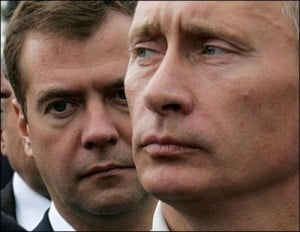
As the presidential elections approach in Russia with the vote due in March 2012, media and opinion polls point out at the growing apathy amongst Russian population. Gloomy and grim attitudes stem from widespread perceptions that the positions of president and prime minister are predetermined with Putin’s comeback to the Kremlin is almost sure. With that said, it is interesting to see what Russians think about Putin and whether they welcome or resist his return.
As reported by Levada Research Center, the majority of respondents believe that the Putin-Medvedev tandem will determine the presidential outcome with a 43% of the votes. However, many Russian citizens support Putin’s candidacy for presidency and see his policies as generally favorable for Russia.
According to the polls, the announcement on Putin’s participation in the elections did not evoke any feelings to 41% of respondents, but 31% approved this decision. When the respondents were offered a choice to nominate their candidate for presidency, July and October polls showed clear dominance of the current prime minister among other current political candidates. What can explain the attitude of Russian citizens? Why Medvedev, perceived as a ‘more liberal’ president does not lead the polls? The fact is that democracy and good politicking do not always constitute the top measurement for broad popular approval.
First, most Russians believe that order is indispensable for the country’s well being. 42% of respondents find that Russian people are in constant need of a ‘strong hand’ and a large number of respondents see Putin as a political leader capable to maintain order in the country, and also re-establish appropriate status of Russia in the world. Back in 2001 Russian people welcomed a new ‘strong hand’ needed to be able to eliminate corruption and push out big businesses seeking economic and political influence.
A second important criterion includes economic stability and social guaranties. Last year, Putin’s ratings plummeted as the protests against high cost of utilities and corruption were gaining momentum in many Russian cities. In his address to the Russian Parliament in April this year, Putin pledged to improve life of ordinary people, possibly setting the groundwork for his comeback to presidential powers. At the moment, over 40% believe that Putin is able to resolve economic problems, and that score is significantly higher than those for Medvedev or other political leaders. It is evident, that Putin is popular, and even likely to win presidency in an open election.
Nevertheless, this does not mean complete political apathy by the Russian population towards civil liberties or absolute support for Putin. An ongoing discussion and demands for civil rights and liberties appear in the editorial activity of the oppositional newspaper ‘Novaya Gazeta,’ multiple protests on Triumfalnaya Square and with the increasing power of the Internet savvy, online petitions to dismiss Putin via social media have begun to populate the social circles.
However, the extent of the criticism is not overwhelming and many continue to support the current governmental policies. According to world.public.opinion.org, 56% of Russians support increasing government control of media, 37% agree with the decision of ending the open election of governors, and, 43% support restriction on activity for international NGOs for Human Rights within Russia.
Finally, if one can assume that Putin’s image is mostly associated with stability in the country, political or economic, that will definitely affect perceptions of the population of the soon-to-be President. As the memories of the sweeping economic reforms in 90s, massive inflation and unemployment remain vivid, in some way they breed cautious attitudes towards radical change overall.